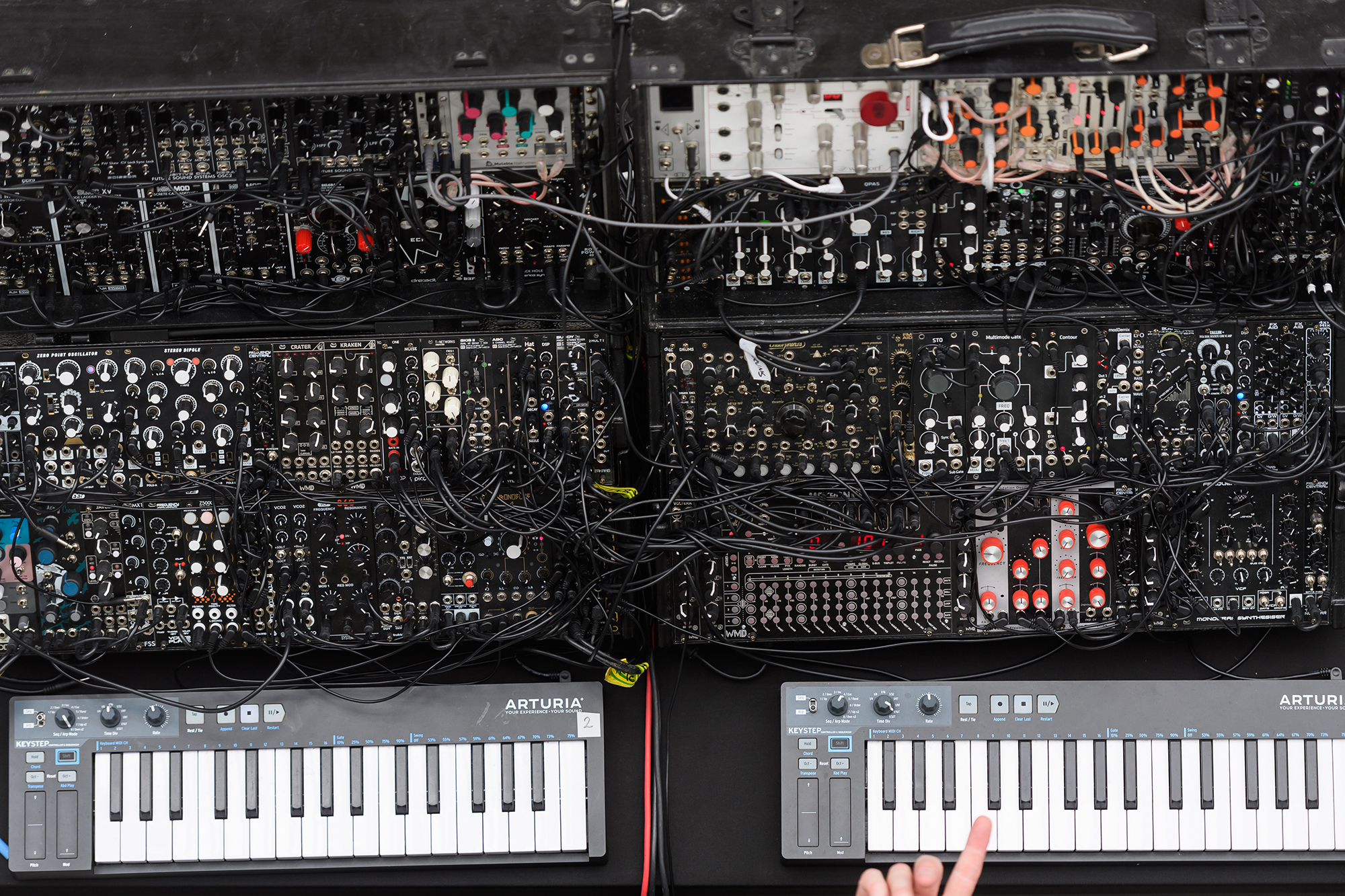The City is Full of Noises: Meet John Biddulph
27 February 2023
John Biddulph looks back on his career in electronic music, and offers a taste of what to expect from his set this March

Following a successful pilot event last year, The City is Full of Noises returns as a month-long electronic music festival in March 2023, featuring performances, workshops, a makers' market, networking and more.
Inspired by Coventry-born pioneer Delia Derbyshire, the programme includes a series of Modular Mondays - drop-in, pop-up performances taking place in our gallery spaces from 12pm - 3pm each week. Among the featured artists is John Biddulph, who will be peforming on Monday 13 March. Ahead of his set, he told us more about his work and what to expect from the event.
Can you tells us a little about yourself and your music?
I am a solo electro-acoustic performer using modular synths, acoustic instruments including saxes, bass clarinet, voice, and many unique electronic devices including a rare Folktek Luminist Garden (not a real garden). I play different sets from experimental electronic to ambient to electro-jazz. I’ve played many solo and headline events and opened for Ulrich Schnauss and Thorsten Quaeschning (Tangerine Dream), Erland Cooper, Ultramarine, Bitchin’ Bajas, Jools Holland, Loose Tubes, and others.
I am currently resident musician for Birmingham Modular Organisation and over the years I've played at many venues and festivals, both close to home and across the UK. My music has been broadcast on BBC Introducing, BBC Radios 3 & 4, and live on YouTube. I’ve also composed music for the theatre and had my compositions performed in places ranging from the Huddersfield Contemporary Music Festival to a basement in a house in Manchester with musicians who later formed Soft Machine. In the early 1990s, I was Director of an electronic music studio and taught at UCE (now BCU) at Birmingham Conservatoire.
I enjoy taking my portable kit around and performing in spaces not typically used for live music, and am always on the look-out for unusual spaces in my self-appointed role as "secret busker". I have a multi-pocketed coat that I fill with small loudspeakers, a mixer and sound-making devices that I take around with me to this end. I've performed next to a moss wall on the High Peak Trail where I used biofeedback from the moss to modify my sounds. I've played at a number of ancient sites and monuments, in a disused factory, in a slate mine, a cathedral, the Pantheon in Rome and Moseley Baths, in disused underground stations and at Gullfoss in Iceland.
What attracted you to electronic music and made you decide to start making music with modular synths?
I went to music college in the 1970s where, in addition to practising the clarinet, saxophone, flute, and piano in a small, darkened room, I had the remarkable opportunity to use a huge modular Moog synthesiser and 2 Revox reel-to-reel tape recorders, and the inspiration of two extraordinary composition mentors. I spent a lot of my time exploring the possibilities of electronic sound and have continued to do so ever since.
By day I work as an autism consultant - a career I try to balance with my musical endeavours. Possibly my biggest regret is having declined an apprenticeship with the BBC Radiophonic Workshop that I was offered while I was retraining. I'd have loved to be able to say that I worked at the same place as Delia Derbyshire - albeit not at the same time - but it wasn't to be!
How easy it is to pick up and learn to make music with modular synths?
When starting out with modular synths, it's very easy to make something that sounds like everyone else who uses them, but the challenge for me is to use them to produce music that sounds different. Modular synths offer the user an opportunity to develop their own musical voice, their musical ‘signature’ if you like. This can take a long time to achieve, but it is immensely rewarding.
Over decades, I’ve written a series of ‘divergent strategies’ to be used by electronic musicians as starting points for composing and performing with synthesisers - a bit like Brian Eno’s ‘Oblique Strategies’, except that only I started making mine in 1972!
What can you tell us about your performance as part of The City is Full of noises?
I'm hugely excited to be taking part in The City is Full of Noises 2023. I'm planning to perform some of my most recent and ongoing composing work inspired by my favourite Shakespeare speech - an extract from The Tempest known as "Caliban’s Dream". Purely by coincidence, the speech seems to connect well with The City is Full of Noises:
Be not afeard; the isle is full of noises,
Sounds and sweet airs, that give delight, and hurt not.
Sometimes a thousand twangling instruments
Will hum about mine ears; and sometime voices,
That, if I then had waked after long sleep,
Will make me sleep again: and then, in dreaming,
The clouds methought would open, and show riches
Ready to drop upon me; that, when I waked,
I cried to dream again.
In terms of what it will sound like, the music will bring together voices (sampled, processed, and tape recorded – including medieval texts and scores, Japanese, Tibetan and Icelandic), hopefully a few sweet airs, and some twangling (electronic) instruments.
Do you have a favourite electronic music album or track?
It's impossible to pick just one! Currently, I'm listening to a lot of music by Mira Calix, Abul Mogard, and Carbon Based Lifeforms. A couple of long-term favourites never too far from my turntable include Stockhausen’s Gesange der Jünlinge (which is as old as I am!) and Edgard Varèse’s Poème électronique (which is three years younger).
John Biddulph will perform a Modular Monday session as part of The City is Full of Noises on Monday 13 March. Find out more about our month-long electronic music festival here.